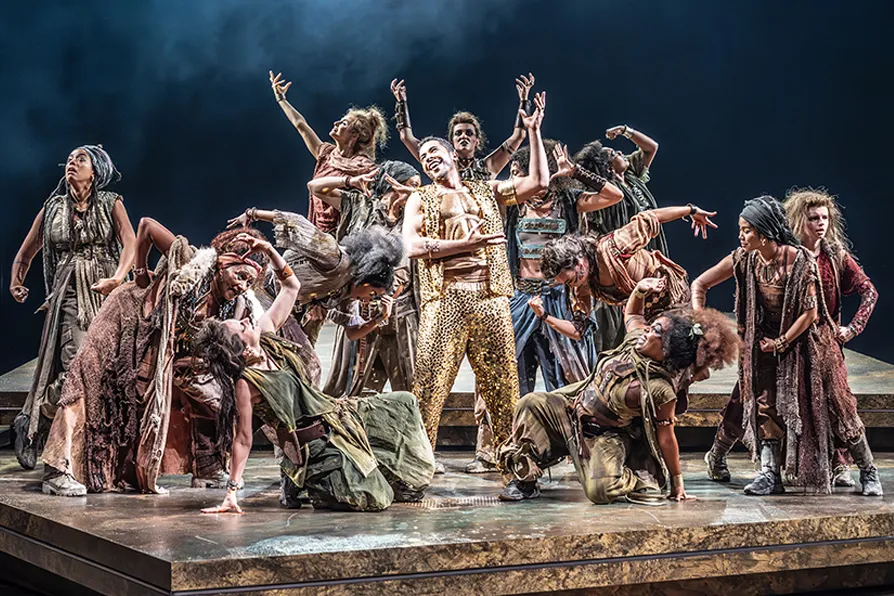RON JACOBS welcomes a timely history of the Anti Imperialist league of America, and the role that culture played in their politics
MARY CONWAY is frustrated by the stylistic muddle that arises when you apply a pub theatre sensibility to a towering Greek tragedy

 UNHINGED: Ukweli Roach’s Dionysos eggs on his uninhibited company of Bacchae [Pic: Marc Brenner]
UNHINGED: Ukweli Roach’s Dionysos eggs on his uninhibited company of Bacchae [Pic: Marc Brenner]
Bacchae
National Theatre Olivier
★★★
BACCHAE at the Olivier opens thrillingly when a vast illuminated halo rises to prominence, in its centre a massive white horse powering towards us with quivering mane and pools for eyes. At once, we are in a magical, ancient world where fabulous beasts pound the Earth and gods wander among us.
But then we come down to reality with a bump, the magic immediately debunked by actors who take to the stage and address us as if they were stand-up comics.
And here’s the problem: this new alternative version of that towering Greek tragedy
promises one thing then gives us another until we really don’t know what we should be thinking, who we’re gunning for or indeed quite what play we’re watching. It’s a stylistic and narrative muddle.
Not that there isn’t also much to enjoy.
The play tells of the god, Dionysos, who — fathered by Zeus — wants his cousin Pentheus — despotic king of Thebes — to accept his divinity and welcome his entourage into the kingdom. Dionysos’s followers (the original Bacchae and also a traditional Greek chorus) are an array of pugnacious, pitiless, foul-mouthed women. Dionysos, being the god of wine and general depravity, represents freedom from all cultural constraint and conformity, and, in his name, his largely unhinged Bacchae call on the women of Thebes to resist oppression and give vent to all their desires. Good thinking for a modern audience!
What works well is James McCardle’s boisterous, declamatory performance as Pentheus — whose eventual mission is to rescue his mother from the Bacchae — and Ukweli Roach’s golden Dionysos who writhes — and, yes, twerks — with unstoppable ease. Simon Startin’s Tiresias comfortingly connects us to the original Greek legend, while the Bacchae create endless humour as they bellow their obscenities in a wild assortment of regional accents, their anarchic assault on the right-wing, oppressive regime of Thebes evoking our modern world of culture conflict, migration and opposing ideologies.
With dance and wild music thrown in for good measure, there is energy galore. And some fabulous lighting and stage effects.
The show, though, veers from almost Brechtian at times to full-blown pantomime at others and sadly loses the greatness of the original, becoming open to an accusation of dumbing down.
This is the first production directed by Indhu Rubasingham during her new tenure as Artistic Director of the National Theatre and she brings with her much of the audience rapport she cultivated so skilfully in the same role at the Kiln. Humour, lightness of touch, lack of pomposity and a mission to escape mono-culturalism has characterised her work for the last decade and more, and is evident here. Meanwhile writer Nima Taleghani — who rethinks Euripides’s original — throws in comedy and word-play at every turn, strong in the knowledge that this is the first debut play by a writer ever to grace the National stage.
This is a glitzy start for Rubasingham, and a brave one. But, despite the fabulous Olivier resources at her disposal, her Bacchae feels more like pub theatre than high art.
Runs until November 1. Box Office: 020 3989 5455, nationaltheatre.org.uk










